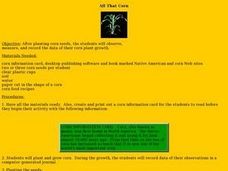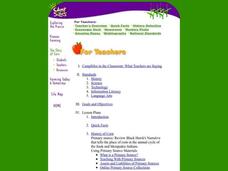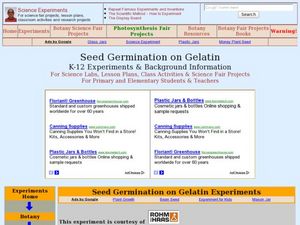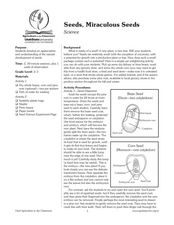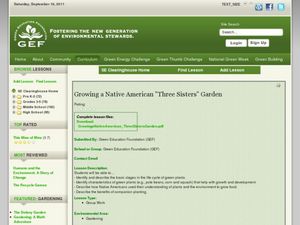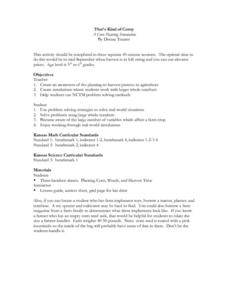Curated OER
Seed Swapping
Here is a fabulous, cross-curicular lesson on seeds. Elements of science, writing, math, agricultural practices, and art are all brought into this incredibly thorough plan. Additionally, a fun whole-class game is presented, and there is...
Curated OER
Germination: Name that Seed
High schoolers investigate seeds, flowers and germinating seeds. In this germination lesson plan, students observe a stalk of corn, a corn seed, Gladiolas and glass jars containing germinating sees and plants. High schoolers answer 8...
Curated OER
The Living Corn Necklace
Fifth graders generate two types of corn seeds, Dent corn and Indian corn to compare the similarities and differences of each of the seedlings. The preferred seedlings are determined through observations made by Students.
Curated OER
Growing from Seed
High school or college horticulturists will appreciate this PowerPoint on seed-propagation. It walks them through the science behind seed production and germination as well as the requirements for growing plants from this stage....
Agriculture in the Classroom
Seed Match
Using this resource, your team of green thumbs discuss why plants are a part of a healthy diet and the different ways they are used in daily life. They then observe the characteristics of different seed as they attempt to match...
Curated OER
Seed Sensations!
First graders examine seeds. In this Science lesson, 1st graders classify and dissect seeds. Students sprout their own seeds in the classroom.
Curated OER
How Does Your Garden Grow?
Young gardners read and listen to books about seeds, plants, and the growing process. They plant seeds in plastic cups to observe the process of root-growing and plant formation. The whole class walks through a field to collect seeds...
Curated OER
All That Corn
Students observe and record data. For this plant growth lesson, students plant and grow corn. Students observe the growth of their corn and record their data. Students read corn recipes and select their favorite four...
Curated OER
Corn: An A-maizing Plant
Students explore the corn crop. In this farming lesson, students identify which states are in the corn belt and read about the history of corn, its uses and its development and growth. Students dissect a corn kernel. Students discuss the...
Curated OER
Corn and Tortillas
In this reading comprehension worksheet, students read a 1-page selection regarding corn and then respond to 7 matching questions regarding foods made with corn. Students then respond to 7 matching questions involving Spanish words. A...
Curated OER
The Story of Corn
Students use primary sources to compare the early development of corn with current techniques of biotechnology and genetically engineered seeds, and identify plants natural to the Americas and those natural to Europe that were part of...
Curated OER
Seed Germination on Gelatin
Young scholars examine how seeds germinate in a culture. In this germination instructional activity students germinate seeds in gelatin and observe the growth of the plant.
Curated OER
Seeds, Miraculous Seeds
Students investigate the growth of seeds. For this agricultural lesson, students dissect a bean and corn seed and identify the parts of the seed. Students observe the development of a pinto bean seed and record observations on the...
Curated OER
Sorting Things Out
Written to examine seeds that grow in Kansas, you can adapt this lesson to anywhere you live. Learners sort a mixture of five different seeds to by any characteristic of their choice. When your budding scientists are exploring the life...
Curated OER
Seeds, Miraculous Seed
Students investigate relationships between plants and animals and how living things change during their lives. In this life cycle activity, students split different types of seeds apart to see the beginning life stages of future plants.
Curated OER
Seed Sorting 101
Students sort through numerous seeds to find similarities and differences. In this sorting and classifying instructional activity, students divide up different plant seeds based on their similarities and differences, while keeping record...
Curated OER
Incredible Seeds
Second graders are given a group of seeds and put in small groups. They classify their seeds based on their observations with 90% accuracy. Students draw a picture of each seed showing at least 2 characteristics of each. They write 1...
Curated OER
Corn Harvest
Learners read Corn Belt Harvest and write sentences about corn's uses. They visit a cornfield and a grain elevator or have guest speakers come to class. They design posters about harvesting or processing corn into grain.
Curated OER
How a Seed Grows: And Who Grows It
Second graders explore botany by viewing video clips in class. In this seed growth lesson, 2nd graders identify the types of seeds that grow specific plants and what the optimal conditions are for growing seeds. Students view a video...
Curated OER
Living Corn Necklace
Fifth graders explore heredity and observable traits through experimentation. They view several different types of corn and record their observation of physical traits on a class chart. They create a corn necklace by sprouting dried...
Curated OER
Growing a Native American "Three Sisters" Garden
Students explore plant life by creating their own gardens in class. In this food growing lesson plan, students discuss the types of gardening methods Native Americans used in order to keep healthy. Students plant corn seeds in their...
Curated OER
Seed Sensation
Students explore seeds through dissecting, sorting, comparing and contrasting. They draw their observations of both a closed and open seed and then they label the parts of a seed. They brainstorm where seeds come from. They compare seeds...
Curated OER
Next Year's Seeds
Reading, a math game, and a simulation activity provide the engagement on a instructional activity about seeds and crops. Learners in grades two through four read an informational passage about crops, seeds, and farming. They highlight...
Curated OER
That's Kind of Corny!
Students apply math skills to determining how much corn seed to plant in 100 acres. They compute the amount of weed killer needed and after totaling how many bushels per acre they harvest, they calculate their profits.









